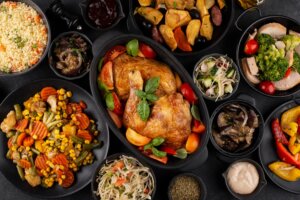Daily Food Consumption and Cancer
A table full of delicious food (Free Pic, 2021)
By: TedroyC, COTA
The act of sharing a meal is a time-honored custom that is handed down through the ages. But do you know that your food may be linked to Cancer? I love food, and I am sure most of you do too! There’s so much misinformation out there about certain foods and their supposed links to Cancer.
It is not very clear to separate fact from fiction. It’s frustrating how false information can quickly spread and make us more fearful. That fear stops us from thoroughly enjoying these fantastic and delicious foods. Join me as I investigate the possible link between the foods we eat daily and their possible link to Cancer.
Myth: Drinking ensure is linked to Cancer
Fact: Ensure is a high protein and high sugar drink. Consuming sugary drinks is not always the best option, but supplements like Ensure have not been linked to cancer. So you can enjoy them without any concerns! For people who are malnourished, not getting the right supplements like Ensure can be fatal.
Myth: Eating your favorite cereals is linked to Cancer
Fact: Cereals are tasty but must be kept on a shelf for a long by adding preservatives to them. BHT is a preservative added to cereal to sustain its shelf life. It is safe for human consumption with no links to cancer. It is quickly processed and eliminated from the body as waste materials. There are no lingering unpleasant effects, so enjoy foods containing this additive!
Myth: Eating tasty Rotisserie Chicken is linked to Cancer
Fact: Rotisserie Chicken contains a food additive (carrageenan), which stabilizes, thickens and gels food. This additive is safe for consumption and has no unpleasant effects on the stomach. There are no links between this additive and the growth of cancer cells.
We must remember that food and nutrients are not the only causes of Cancer. A healthy diet and lifestyle can reduce our cancer risk. We can control our health and reduce cancer risk by making simple, informed food choices. Let’s work together to stay healthy and happy!
References
European Food Safety Authority. (2012, March 7). Scientific Opinion on re-evaluating butylated hydroxytoluene BHT (E 321) as a food additive. Retrieved from https://www.efsa.europa.eu/en/efsajournal/pub/2588#:~:text=The%20Panel%20concluded%20that%20BHT,any%20carcinogenicity%20would%20be%20thresholded.
Makarem, N., Bandera, E. V., Nicholson, J., & Parekh, N. (2018). Consumption of sugars, sugary foods, and beverages concerning cancer risk: A Systematic review of longitudinal studies. Annual Review of Nutrition, 38(1), 17–39. https://doi.org/10.1146/annurev-nutr-082117-051805
McKim, J. M., Willoughby, J. A., Sr, Blakemore, W. R., & Weiner, M. L. (2019). Clarifying the confusion between poligeenan, degraded carrageenan, and carrageenan: A review of the chemistry, nomenclature, and in vivo toxicology by the oral route. Critical reviews in food science and nutrition, 59(19), 3054–3073. https://doi.org/10.1080/10408398.2018.1481822


Hi Tedroy, I absolutely loved your blog post. I definitely think that there are a lot of disorders and diseases that are becoming more prevalent over the years, and a lot of the causes I believe are related to certain foods we are consuming. I thought it was interesting when you included certain facts and myths. I have heard a lot of these myths, and unbeknownst to me, thought some of them held a little truth, but because of your information, I stand corrected and more knowledgeable. I also stand with your comment about how ” it is frustrating false information can spread” I agree, I think it is alarming when we may find out that something we love to eat is not good for us, and then we start to spiral and think bad thoughts and become anxiety ridden, all for it not to be true. I also think it is interesting the current fads that some individuals follow such as the “shakeology” or “herbalife” they are broadcasted by the media to be healthy, but in reality, they are not and we have found that out because of studies of conditions they have caused in some individuals, or organ damage.
Hi Tedroy,
I was instantly drawn in by the attention-grabbing title because food is a topic that everyone loves. Controversy has always surrounded the ongoing discussion about the causes of cancer. An easy-to-understand list of misconceptions and facts is presented in an effective and simple manner in your blog article. I was especially impressed with the information’s organization. The large number of people who have changed their diets and avoided particular ingredients—like oil and salt—as a result of deceptive advertising is startling. Thank you for shedding light towards this topic.